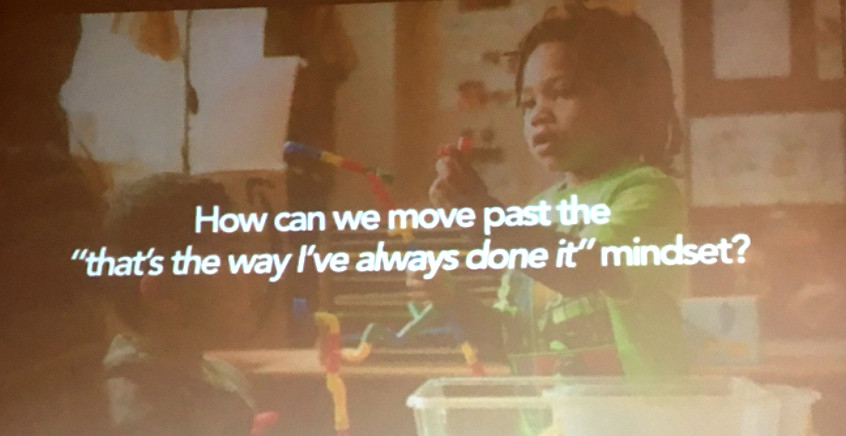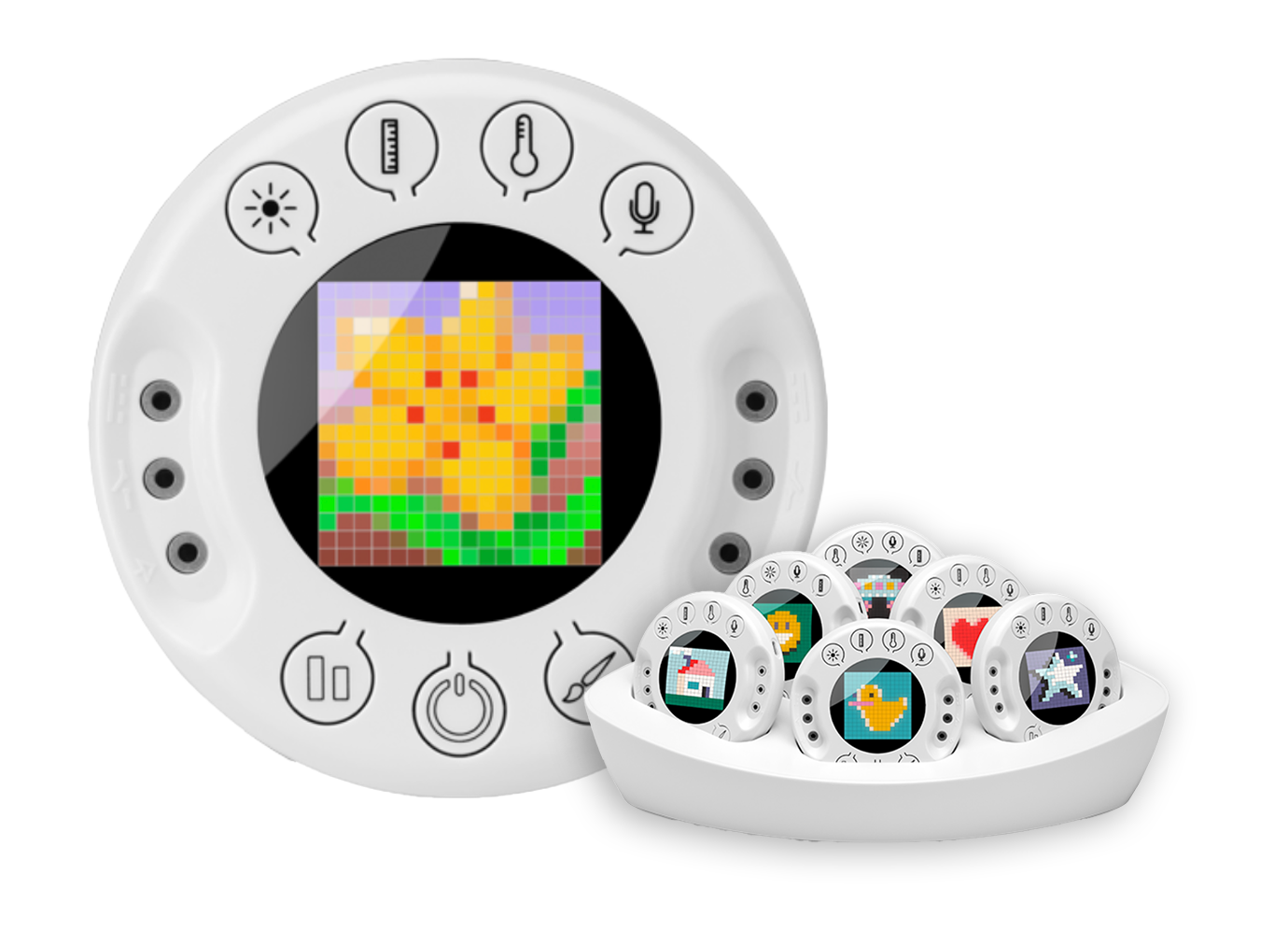EdTech Coaching in Today’s Classrooms
Instead of just presenting my ideas, we had a brainstorming session. I gave them access to an editable Google Sheets where we began building an action plan.
It was a great pleasure to attend the New Hampshire Christa McAuliffe Tech Conference (@nhcmtc) recently, where I had the opportunity to facilitate three sessions.
On the second day, the morning keynote was delivered by the talented Tom Murray (@thomascmurray) from Future Ready. Tom made many points that resonated and motivated me. But one made me think, “I need to change how I present my session.” This statement hit me right in the face as I sat in the front row:

I know I have said this line during my time as a principal and as a district tech director, but something that morning made me question my own practice. I was about to give my third PowerPoint presentation with slides, images, and content…like I “always did.” My final session on edtech coaching was just twenty minutes after Tom’s keynote speech, but I decided it wasn’t too late to mix things up.
I started the session as I usually do by posing the question from Daniel Pink: “Are we preparing our students for their future or our past?” I then moved to the “Problem Statement” to set the foundation for the session: “Schools often launch new technology without a plan for supporting and coaching teachers through the process of using the devices and software in their classrooms. Supporting teachers is key and the goal of this session will be to provide strategies to we support educators on this critical journey.”
Ted Dindersmith asks: “Will our children be prepared for the future of work?” So, I wanted to ask this group of educators: “Will our teachers be prepared to educate our students for the future of work?”
We discussed the challenge in schools when instructional coaches are used only to train new teachers or teachers who are not making the cut. This is not an effective use of instructional coaches. Think about Serena Williams or Adele. Both are incredibly successful at what they do, but they both use coaches to be even better. (Patrick Mouratoglou coaches Williams; Ron Anderson is the vocal coach for Adele.)

The coaching process is very task oriented with a focus on teacher needs. Whereas mentoring is a long-term connection, coaching (for the most part) is short term. A coach can successfully be involved for a short period of time or as long as is needed, depending on the purpose. The purpose of coaching is to improve the individual's performance as an educator.
Tech & Learning Newsletter
Tools and ideas to transform education. Sign up below.
I felt I’d set the stage for the content, articulated the problem, identified goals, and given examples. It was time to shift the session. I was in a room of educators who also were edtech coaches; I wanted to hear what they had to say. Instead of just presenting my ideas, we had a brainstorming session. I gave them access to an editable Google Sheets where we began building an action plan.
[Tech Tools for Active Learning Classrooms]
We started with “why was edtech instructional coaching necessary?” The group had wonderful explanations and phrases that could be used to support the use of edtech instructional coaches. Below are some of these critical “why” statements:
- To help teachers enhance their lessons
- If we expect students to collaborate, we need to collaborate as well. Model what we preach.
- To assist teachers reaching educational and edtech goals while engaging students to create new things.
- Humanity does not equal perfection. We can all learn from one another.
- If we teach kids to never stop learning, we need to never stop learning.
- To help teachers become comfortable with edtech tools they use to teach.
Once we established the “why,” we moved to identifying essential edtech instructional coaching skills. Key skills includes:
- Non-judgmental:-a coach/teacher relationship is about growth, not about evaluation.
- Another key element identified was approachable. Being an individual that others wanted to connect is important as you build a connection with a teacher.
- A third point we identified was patience. Having patience to support teachers know how to integrate existing tech with instructional best practices and strategies will ease fears and increase risk taking with tools.
Other skills identified included:
- Active listening
- Perseverance
- Problem solving
- Empathy
- Providing growth focused feedback
- Flexibility
- Open mindedness
The final skill we talked about was the ability to build relationships with teachers. Building relationships is one of those phrases that is universal in education, but what does that look like in practice? We started with a few common ideas that included: talk with teachers, stop into classrooms, and visit classrooms just to connect with teachers. We then moved to more ideas that have proven to build relationships. These actions included:
- Visiting PLC/Team meetings to provide support and talk about coaching.
- Allow a choice PD “work session” day for teachers to work with other educators
- Weekly EdTech tip emails
- Lunch ‘n learn times
- Have a sit in day in the library where people can stop in for support and ideas.
The last part of the sessions focused on celebrating teacher success. Each step in the coaching process (goal setting, co-planning lessons, observing the teacher, and debriefing lesson) takes effort and trust. It is critical to celebrate the successes and encourage more coaching opportunities. Each session participant shared an example of success and we encouraged each other to model this celebration process at future faculty meetings to encourage this coaching relationship.
We concluded the session with an action plan of ideas that each attendee could bring back to their schools to increase the use of edtech coaching. Thank you, Tom Murray, for pushing my thinking!
cross posted at techinnovation.live
Dr. Matthew X. Joseph is currently the Director of Digital Learning and Innovation for the Milford Public School District in Milford, MA. Before coming to Milford, he was a building principal for 11 years in Natick, MA and Attleboro, MA. Other professional roles include: classroom teacher, district professional development specialist supporting leadership and technology instruction. Matt holds licenses in general education, school administration, and Massachusetts superintendent. His master’s degree is in special education and earned his Ed.D. in Educational Leadership from Boston College.
Throughout his career, Matt focused on what is in the best interest of students and pushing the limits to achieve excellence in schools. He is an instructional leader constantly looking for student and school improvement while building community and continued teacher improvement. He is passionate about building a collaborative school culture, creating a school of learners utilizing 21st century instructional tools, and developing leaders’ communication techniques to enhance instruction and parent communication.
Follow Dr. Joseph on twitter at @MatthewXJoseph or read his blog techinnovation.live
Dr. Matthew X. Joseph (@ MatthewXJoseph) is Director of Evaluation and Supervision in Brockton, MA.
